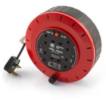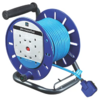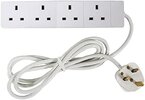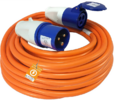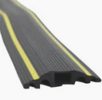The mother-in-law bought an electric fire (from B&Q) and, as she was already having some work done, asked the gas man to connect it up for her. Now I am not criticising gas men generally, I know one or two good blokes, but this chap was happy to use a standard multi-socket extension lead as the nearest wall socket was too far away for the fire's lead and fitted plug.
The other day, while the wife was visiting her mother, she could smell burning from the plug inserted in a socket of the extension lead. She sensibly unplugged the extension lead from the wall socket (this end was perfectly cool) and felt the fire's plug was "red hot". After waiting for it to cool, she tried to extract it from the extension lead socket, but it seemed to be welded in!
She called in an electrician, who suggested that he could attach a new wall socket near to the fire, wired from the existing wall socket, and run the cables in a trunk along the wall or under the floorboards.
All well and good, but why should standard mains cables be safer than an extension lead? The only difference I can see is that the interim connections could be 'weak points', which would explain the 'red hot' plug being welded in. Is this the reason for B&Q instructions not to use extension leads, although the cabling in a lead and a fitted cable are likely to be similar in specifications?
Incidentally, the fire is still within a three-year warranty. Unfortunately, the documentation supplied by B&Q states, "Do not use an extension lead!", which, of course, will have made the warranty now invalid.
I have thought that, although we have no claim on B&Q, we could cut off the damaged plug and attach another and continue to use the fire. However, doing this would also invalidate the warranty, I assume, and the electrician also advised against doing this,
Any advice or comments, and even criticisms! are very welcome.
The other day, while the wife was visiting her mother, she could smell burning from the plug inserted in a socket of the extension lead. She sensibly unplugged the extension lead from the wall socket (this end was perfectly cool) and felt the fire's plug was "red hot". After waiting for it to cool, she tried to extract it from the extension lead socket, but it seemed to be welded in!
She called in an electrician, who suggested that he could attach a new wall socket near to the fire, wired from the existing wall socket, and run the cables in a trunk along the wall or under the floorboards.
All well and good, but why should standard mains cables be safer than an extension lead? The only difference I can see is that the interim connections could be 'weak points', which would explain the 'red hot' plug being welded in. Is this the reason for B&Q instructions not to use extension leads, although the cabling in a lead and a fitted cable are likely to be similar in specifications?
Incidentally, the fire is still within a three-year warranty. Unfortunately, the documentation supplied by B&Q states, "Do not use an extension lead!", which, of course, will have made the warranty now invalid.
I have thought that, although we have no claim on B&Q, we could cut off the damaged plug and attach another and continue to use the fire. However, doing this would also invalidate the warranty, I assume, and the electrician also advised against doing this,
Any advice or comments, and even criticisms! are very welcome.


